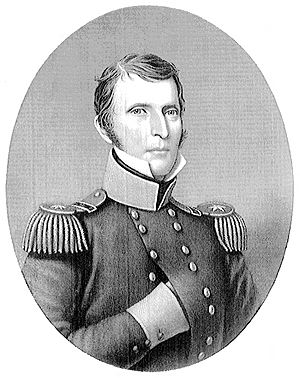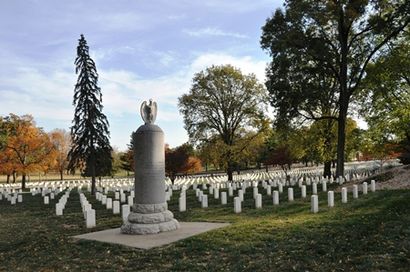Henry Leavenworth facts for kids
Quick facts for kids
Henry Leavenworth
|
|
|---|---|

General Henry Leavenworth
|
|
| Born | December 10, 1783 New Haven, Connecticut, U.S. |
| Died | July 21, 1834 (aged 50) Cross Timbers, Indian Territory (near modern Kingston, Oklahoma, U.S.) |
| Allegiance | United States of America |
| Service/ |
United States Army |
| Years of service | 1812–1834 |
| Rank | Brigadier general |
| Battles/wars | War of 1812, Battle of Niagara, Arikara War |
Henry Leavenworth (December 10, 1783 – July 21, 1834) was an important American soldier. He served in the War of 1812 and led early military trips against Native American tribes on the Great Plains. He is well-known for creating Fort Leavenworth in Kansas. Many places are named after him, including the city of Leavenworth, Kansas, Leavenworth County, Kansas, and the Leavenworth Penitentiary.
Contents
Early Life and Learning
Henry Leavenworth was born in New Haven, Connecticut. His parents were Jesse and Catharine Leavenworth. When he was young, his father moved with the children to Danville, Vermont. There, Henry received his education. Later, he studied law with General Erastus Root in Delhi, New York. After becoming a lawyer, he worked with General Root until 1812.
Military Adventures
Serving in the War of 1812
In April 1812, Henry Leavenworth became a captain in the U.S. Army. This was just before the War of 1812 began. By August 1813, he was promoted to major. He was hurt during the Battle of Niagara on July 25, 1814. In November of that year, he was given the honorary rank of colonel.
After the War
After the war, Leavenworth served in the New York State Assembly in 1816. He then moved to Prairie du Chien, Wisconsin to work with Native American tribes. In February 1818, he became a lieutenant-colonel in the Fifth U.S. Infantry. In 1820, he started building Fort St. Anthony.
Leading Expeditions
In 1823, Leavenworth led U.S. Army troops in the Arikara War. This was the first time the U.S. military had a major expedition against a Great Plains Native American nation. While working in the western parts of the country, he built several military bases. One of these was Fort Leavenworth, Kansas, which he started on May 8, 1827. It is now one of the most important military bases in the United States. In 1825, he was given the honorary rank of brigadier general.
In 1834, he commanded the United States Regiment of Dragoons. This group traveled from Fort Gibson, Indian Territory to the Wichita Mountains. The famous artist George Catlin was also on this trip and wrote about Leavenworth's death. They hoped to meet and create formal relationships between the United States and the Comanche, Kiowa, and Wichita peoples.
His Passing

General Leavenworth passed away in the Cross Timbers area of the Indian Territory on July 21, 1834. This area is near modern Kingston, Oklahoma. He died from either sickness or an accident while hunting buffalo. At the time, he was leading an expedition against the Pawnee and Comanche tribes. His regiment built a monument for him at Cross Timbers. He was first buried in Delhi, but his remains were later moved to Fort Leavenworth National Cemetery.
Family Life
Henry Leavenworth was married three times. He had two children with his first wife, Elizabeth Eunice Morrison. He then married Electa Knapp, who passed away within a year. His third wife was Harriet Lovejoy, and they had another child. Lake Harriet in Minneapolis is named after Harriet Lovejoy.
His son, Jesse Henry Leavenworth, also had a career in the military.
His Lasting Legacy
Many places are named after Henry Leavenworth. These include Fort Leavenworth, Kansas, Leavenworth County, Kansas, and the Leavenworth Penitentiary. Henry Leavenworth Elementary School and Leavenworth Street in Omaha, Nebraska are also named in his honor. The United States Disciplinary Barracks (USDB) at Fort Leavenworth is often simply called "Leavenworth."
See also
- First Dragoon Expedition - Learn more about the time and place of General Leavenworth's death.
- Fort Snelling, Minnesota - A fort that helped with mapping fur trading routes earlier in his career.

